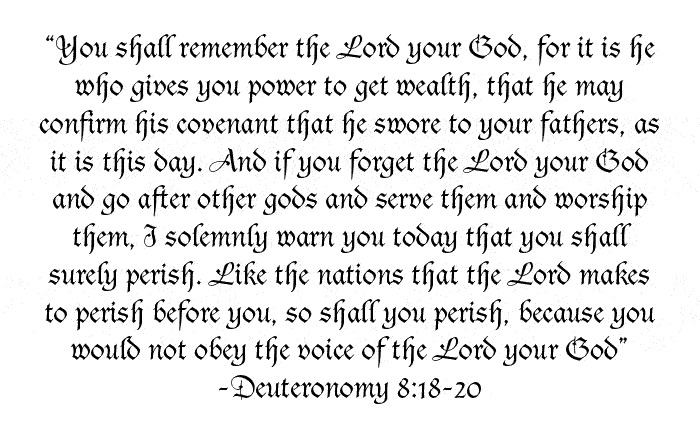I think this verse and many like it treat memory quite differently than we moderns. Remembering is equated with obedience. We like to think that forgetting is a good excuse for disobedience. “Oh, I forgot I was supposed to do that God, so I guess Im off the hook.” And then we think everything is going to be ok. In reality we have unknowingly confessed another sin, forgetting.
I heard an interview with a woman a few years ago, who had perfect recall. I can’t remember her name but as she detailed what it was like, I could only praise God for forgetting. Her husband had died a few years earlier, and for her it was like it had just happened. Every person that had ever wronged her, was right there, as if it too had just happened. And I suppose the same goes for every wrong she had committed. She had to simply discipline herself to drop these things or they would consume her. Perfect memory is a curse.
But these verses still apply to this woman, as they do to all of us. We are to sort through all of the events of our lives and the media or people clambering for our attention, and remember, focus on what God has done for us, what he has done for his people in history and what he commands us to do. This means knowing God’s Word. Whatever our physiological ability or our training in memory we are commanded to do it, we have no excuse. It’s like the last scene of that action movie where the dying man speaks the combination the hero needs to save the world. When it’s important you don’t forget. The Word and works of God are important, we shouldn’t forget.
I heard N. T. Wright recently comment that our memory is a way of bringing the past into the present. God is outside of time, yet he has created time as a good thing for us to exist within. Memory is a gift to mankind, the ability to transcend time. In building future faithful generations and establishing institutions on solid foundations and exhorting them to remember, we can also go the other way, into the future.
In the Vita Nuova, Dante referred to his memory as a book:
“In that book which is my memory, On the first page of the chapter that is the day when I first met you, Appear the words, ‘Here begins a new life’.”
And in a very real sense the Bible, which we cherish is exactly this, a book of memory, under the heading “here begins new life”. The Scripture is the memory of God’s people, of the ways in which God has blessed them and the commands he has earned the right to give based on his faithful track record. This is why telling history rightly is so crucially important.
“Then Moses said to the people, “Remember this day in which you came out from Egypt, out of the house of slavery, for by a strong hand the Lord brought you out from this place”- Exodus 13:3
Moses commanded his people to remember the story the right way. This both brings glory to God for his past work, as well as making it easier to trust him in the future. But soon they were telling a different story.
“And he received the gold from their hand and fashioned it with a graving tool and made a golden calf. And they said, “These are your gods, O Israel, who brought you up out of the land of Egypt” -Exodus 32:4
The events we remember and the way we tell the story, reflects one way or the other on God. History is not just about dead guys and boring dates, it’s a matter of obedience. And it doesn’t just apply to the ancient history in scripture, but also to the way we remember and tell our own stories. I am often disappointed at the way music has degenerated in the past few generations. One way this has happened is in our collectively forgetting the power of music to help us remember. As our forefathers sang through the hymns they put scripture in their minds, they remembered in the way God commands us. Schools used to take advantage of this to inculcated dates and facts into young eager children. It worked wonderfully. But we forgot these blessed methods. In a sense that’s what modernism is, it’s throwing off the past, collective forgetting. We refuse to learn from other’s mistakes and instead want to make all the mistakes ourselves under a systematic process, we call this ‘science’.
Remembering in song is so important. I think this is what Psalm 96 is saying “O sing to the Lord a new song”. It’s not a call to embrace whatever new fad in perverse pop music that is going around. It’s about writing new songs of his faithfulness in your life. Like the Psalms they should be specific and well crafted, something you pass on to your children, a book of memory you can hand them, of God’s faithfulness in your life. Remember the time we were almost broke and God came through at the last minute? I have a lot of these stories from my childhood, when times were tough, we got by as we shared stories of God’s faithfulness with other families. One of these families was the Lockies, he was a potter and he made his family a blessings jar. They would write blessings on pieces of paper throughout the year and put them in the jar, then at the end of the year they would take them out and remember. These scrolls in jars of clay also calls to mind the ancient nature of the written word, before Dante’s bound books of memory. But whichever way you do it, do it well and do it often, remember God’s commands and his works.

